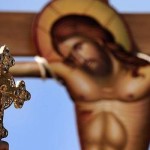By Metropolitan Hierotheos of Nafpaktos
 By his incarnation Christ assumed human nature, and indeed human nature was united with the divine nature immutably, without confusion, inseparably, unchangeably and indivisibly. They are never separated. They remain united forever.
By his incarnation Christ assumed human nature, and indeed human nature was united with the divine nature immutably, without confusion, inseparably, unchangeably and indivisibly. They are never separated. They remain united forever.
Thus the Church will exist also after the Second Coming of Christ and we shall be able to speak of the perfect manifestation of the Church. This is said from the point of view that the saints are already tasting the last things, because, as we said in the beginning, the last things in the Church are not isolated from the first and intermediate things. Living in the Church, we reach the state of Adam in Paradise before the fall, and we ascend still higher, because we attain communion and unity with Christ, united in His Divine-human Body, having become members of His Body.
The saints from now on are enjoying the glory of God, and therefore St. Symeon the New Theologian says that those who have been granted the vision of the uncreated Light are not waiting for the Second Coming, because they are already experiencing the Kingdom of God.
Besides, the Kingdom of God is not something created, nor is it an earthly reality, but, as St. Gregory Palamas teaches, participation in the Kingdom of God is identified and linked with the vision of the uncreated Light.
However, there will be a continuous perfecting of this participation in the glory of God. This is important, because if the future life is a stationary condition, then it will not have fullness. St. Gregory of Sinai says characteristically: “It is said that in the age to come, the Angels and saints ever increase in gifts of grace and never abate their longing for further blessings. No lapse or veering from virtue to vice takes place in that life”.
And St. Gregory Palamas, referring to this point, speaks of the continual development in deification, in man’s continual perfecting. Asking: “Do not the saints progress infinitely in the vision of God in the age to come?” He gives the answer himself:
“In everything it is clearly to infinity”.
Indeed he makes use of the case of the Angels who, according to the teaching of St. Dionysios the Areopagite, become increasingly receptive “to the clearest illumination”. God is infinite and therefore grants His grace abundantly and plentifully. St. Gregory Palamas asks:
“What way is left but for the sons of the age to come, to advance in this to infinity, admitted from grace to grace and patiently making the tireless ascent?”
This will be because, according to the same saint.
“the previous grace empowers them to partake of greater things”.
Of course, in saying these things, we must emphasize that it is not a matter of the restoration of all things, a teaching which was not adopted by the Church, but of the development and perfection of the saints, those who during their lives partook of the purifying, illuminating and deifying energy of God. For those men who did not participate even in the purifying grace of God, that is to say, did not enter the stage of repentance, this good development will not take effect. Furthermore, the passages which we mentioned speak of the saints who acquired the grace of God, and therefore in them the previous grace is empowering towards participation in greater things. Therefore the memorial services which the Church performs for those who have died also have this aim. They help the person in his perfecting, because, according to the teaching of the saints,
“this is the perfect unending perfection of the perfect ones”.
In this sense we can say that after the Second Coming of Christ we shall have a more complete manifestation of the glory of God. And it is in this perspective that we should interpret the teaching of the saints that now we have as a pledge a taste of the good things of the Kingdom of God.
